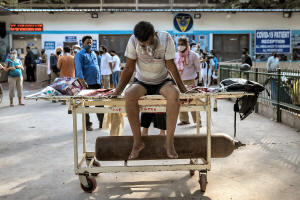Indian hospitals turn away patients in COVID-19 'tsunami'
 Send a link to a friend
Send a link to a friend
 [April 24, 2021]
By Sanjeev Miglani and Manoj Kumar [April 24, 2021]
By Sanjeev Miglani and Manoj Kumar
NEW DELHI (Reuters) - Overwhelmed hospitals
in India begged for oxygen supplies on Saturday as the country's
coronavirus infections soared again overnight in a "tsunami" of disease,
setting a new world record for cases for the third consecutive day.
Max Healthcare, which runs a network of hospitals in north India,
tweeted that it had less than two hours of oxygen left while Fortis
Healthcare, another big chain, said it was suspending new admissions in
Delhi.
"We are running on backup, waiting for supplies since morning," Fortis
said.
India is in the grip of a rampaging second wave of the pandemic, hitting
a rate of one COVID-19 death in just under every four minutes in Delhi
as the capital's underfunded health system buckles.
The government has deployed military planes and trains to get oxygen to
Delhi from the far corners of the country and overseas including
Singapore.
The number of cases across the country of around 1.3 billion rose
overnight by 346,786, the Health Ministry said, for a total of 16.6
million cases, including 189,544 deaths.
COVID-19 deaths rose by 2,624 over the past 24 hours, the highest daily
rate for the country so far. Crematoriums across Delhi said they were
full up and asked grieving families to wait.

Hospitals in Delhi have gone to the city's high court this week seeking
it to order the state and federal governments to make emergency
arrangements for medical supplies, mainly oxygen.
"It's a tsunami. How are we trying to build capacity?" the Delhi high
court asked the state and federal governments in response to this plea.
Television showed families tending to the sick in hospital corridors and
streets as they waited for medical attention.
One man identified as Amit who was grieving for his brother at Delhi's
Jaipur Golden hospital said he had seen families running around with
oxygen cylinders trying to get them refilled.
"You can't leave me in the lurch," a lawyer appearing for the Jaipur
Golden hospital told the high court on Saturday, seeking its
intervention.
The court asked the government to ensure supplies, as well to make
security arrangements for medical centres amid people's desperation.
[to top of second column]
|

A patient suffering from the coronavirus disease (COVID-19) waits to
get admitted outside the casualty ward at Guru Teg Bahadur hospital,
amidst the spread of the disease in New Delhi, India, April 23,
2021. REUTERS/Danish Siddiqui

"We know how people react, let's not have a law and
order situation," the court said in its direction to the
authorities.
India surpassed the U.S. record of 297,430 single-day infections
anywhere in the world on Thursday, making it the global epicentre of
a pandemic that is waning in many other countries.
WINTER EASING
The federal government had declared it had beaten back the
coronavirus in February.
Health experts said India became complacent in the winter, when new
cases were running at about 10,000 a day and seemed to be under
control. Authorities lifted restrictions, allowing for the
resumption of big gatherings.
Others said that it could also be a more dangerous variant of the
virus coursing through India. It is the world's second most populous
country and people live in close proximity, often six to a room.
"While complacency in adhering to masks and physical distancing
might have played a role, it seems increasingly likely that this
second wave has been fuelled by a much more virulent strain," wrote
Vikram Patel, Professor of Global Health at Harvard Medical School,
in the Indian Express.
Experts say the only way India can turn the tide is to ramp up
vaccinations and impose strict lockdowns in the so-called red zones
of high infection. It has opened up the immunisation programme to
all adults but faces a shortage.
India is currently using the AstraZeneca shot and homegrown Covaxin.
It has also approved Russia's Sputnik V and has urged Pfizer Moderna
and Johnson and Johnson to provide it with vaccines.
(GRAPHIC - Interactive graphic tracking global spread of coronavirus:
https://graphics.reuters.com/world-coronavirus-tracker-and-maps/)
(Additional reporting by Aditya Kalra; Editing by Jane Wardell and
Frances Kerry)
[© 2021 Thomson Reuters. All rights
reserved.] Copyright 2021 Reuters. All rights reserved. This material may not be published,
broadcast, rewritten or redistributed.
Thompson Reuters is solely responsible for this content. |